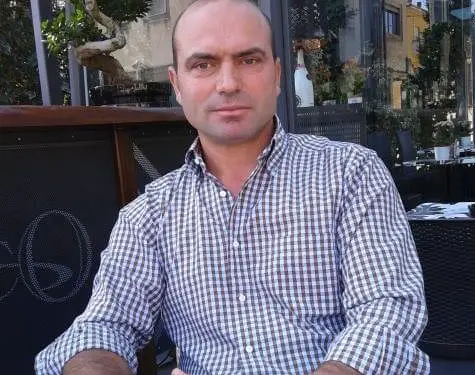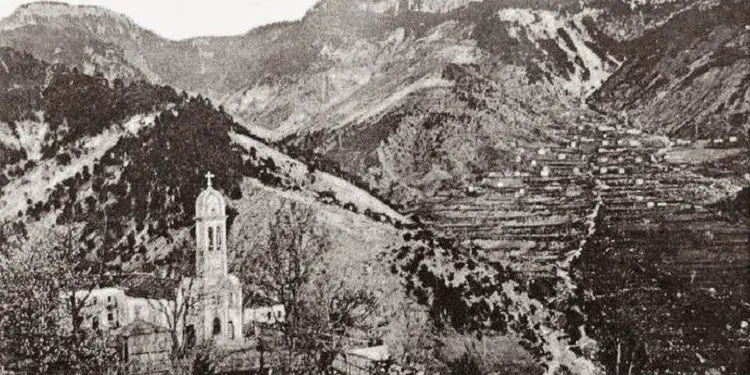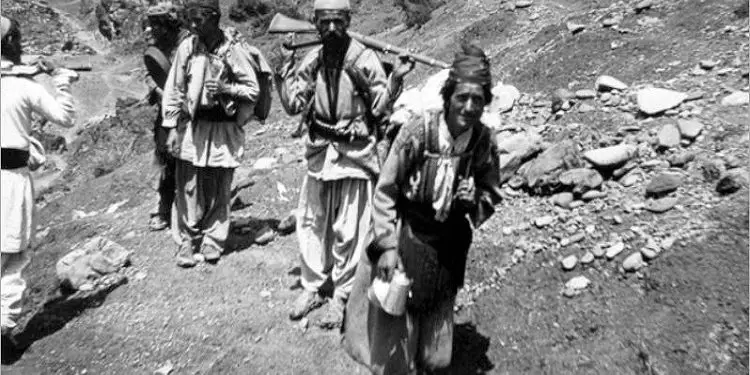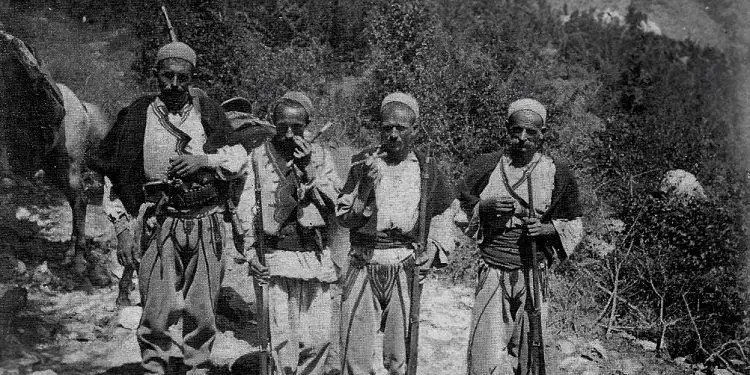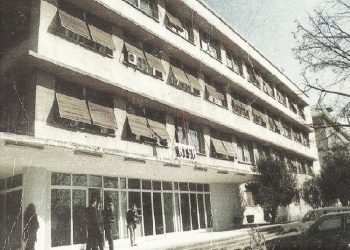By Dodë Melyshi
-The (mythical) weight of the word in Mirdita…!-
Memorie.al / “‘If you bring me Pertena as a matchmaker, you can have my sister’s hand in marriage’ – Preng Gjeta had said.” “It’s just talk,” his friend from Geziq must have thought. With the Përtenas, they were in a fierce and fresh blood feud. And precisely because of them, they were very careful, as a family. The event belongs to around the beginning of the last century (somewhere around the year 1900). The Rrëshen basin, including the Kodra (hill), had cultivated and multiple friendships with Geziq in particular, just as with the whole area beyond the Fan i Vogël river, in general. The river that divided the two regions: Kthella (at that time called Thkelle) as a bajrak and as a region, with Mirdita (historically known as Mërdita). Geziq and Rrëshen are separated by less than ten kilometers.
That half-afternoon spring day, the friend from Geziq, along with a companion, in the form of an intermediary, had headed precisely to the Melyshajs’ tower. With effort and excessive care precisely because of the blood feud he bore on his back. He was asking for the hand of the family’s daughter for a boy he represented.
The girl was named Martine. Martine of Bajraktar Bardhok Doda. In the lineage of generations, she would be our grandfather’s aunt. Who, at her parents’ house, was always called: “Mother Tine?” Having four generations in between, she naturally passed away before my generation was born.
But I have heard so much talk about Mother Tine, with so much kindness, respect, and admiration, that I imagine her as a walking encyclopedia, a woman with a more than sharp mind, and an iron memory. An excellent storyteller and an excellent connoisseur of the area’s histories. Also of the regularity, norms, and customary laws. A peerless educator and motivator. A unique example, not only for women but also for the manliness of the generations that followed.
A reference point of values and principles. I have heard so much talk about Mother Tine in our towers from early childhood until today that this single fact alone is enough for me to understand the specific strength and weight that the Mirdita woman had within her family.
A somewhat silent, invisible, modest weight, without protagonism or vanity, seemingly always one step behind the man, in his respect, but of a vital importance and dynamic in the life of the family, just as, if not more than, the man’s, in many cases.
I have heard so much talk about Mother Tine, that one considers all the ancestors who knew her lucky…!
Preng Gjeta, was the master of the house at the Melyshajs, since Bardhok Doda (his cousin), was no longer alive. He must not have liked this request. Perhaps because for the most selected girl of the Zjarmi (clan), he had high demands. Or perhaps most of all because with the Përtenas, he had an inherited and very sincere friendship and closeness across generations. And he did not find it a worthy thing to make a new friend out of his friends’ enemy.
Preng Gjeta, has remained in the memory of his contemporaries, as a very subtle man. It was said that Pinc Preng Bibë Doda himself, when he organized the twelve-bajrak assemblies, first ensured the presence of the latter before starting. That’s how much he valued him.
And so, that mid-morning in spring 130 years ago, the master of the house had given a kind of sentence:
“I will name Gjon Pertena as the matchmaker for you (I’m not very sure about the name; Gjon or Gjin, or even otherwise), if you want to become my friend”! Applying a communication code that only Mirditas know how to select, process, and serve.
The friend from Geziq would have perhaps preferred to hear a “No, thank you” cut, rather than such an impossible condition. He took a puff of the bitterest tobacco ever. And the coffee and the glass of raki must have seemed the same to him.
He wished “farewell to this stay,” with the respective protocolary thanks, and got up and left quickly. He took the road back to Geziq with much sorrow and thoughts, walking and guarding himself against the pursuit of the enemy.
The tower of the Përtenas and that of the Mëlyshajs were located at a distance of less than one kilometer. The latter at the entrance of the Village and the former almost at the exit, near the church.
Only a few days had passed since the beginning of the event, when at the door of the Përtenas, someone called out: “Oh master of the house!” a man’s voice. They go out to open the way. Who could believe it?! It was the very enemy from Geziq…!
By hook or by crook, eyes wide open, guarding himself fiercely from fear, and giving himself a lot of courage, he had managed to enter Pertena’s territory. They were looking for him in the sky, and he had come to them on earth. He had even come before the Door of the Tower.
“God, let it be a dream.” The patience of some young man of the house had crossed its limits, and he was ready to fire his gun. But this was impossible.
The enemy was now inside the courtyard. He was considered to be under Besa (trust/truce).
The canonical rules of the North excluded such a murder. Categorically. From the moment he had knocked on the door, the enemy, for the short time he would stay, would have to be treated as an ordinary friend. Clench your teeth, arm yourself with patience, and respect the law. Do not bring shame. Do not disgrace yourself with a shameful act. This was an inviolable code, rooted in the Mirdita mentality.
Whoever violated it, whoever trampled upon it, would be covered in shame for generations.
Shame for Mirdita was worse than death! Much worse than death.
The door is now opened to the red-crested enemy. And he is given the place at the head of the hearth. Like a friend. The amazement was even greater than the anger. Even when tribes in blood feud took initiatives for peace and forgiveness, it was always done through the mediation of respected people, from both sides. And not directly at all. Therefore, the curiosity to understand the “madness” of the Geziq man was strong.
“Tomorrow you are free to kill me, whenever you want. But today I have sought you as a friend. I asked for a daughter from the Melyshi family, and they have named you as the matchmaker. If you feel up to it, to lead me, I am in your hands. May your gun become cannon tomorrow, with fate?” – The man from Geziq spoke to Gjon Pertena.
He was left speechless and without any answer. In total numbness. These are a few decikas (seconds), which often determine not only a person’s life but also that of families. Even of society as a whole.
These are a few decikas that have an almost divine blessing in their content. Blessed are those who seize them. Blessed are those who dare and seize the moment.
In those decikas in Pertena’s mind, the idea must have been processed that the enemy from Geziq, from the moment he had the courage to knock on his door, was a lucky man. He had seized the second!
Without daring, there is no victory. He risked so much, and precisely for this reason, he deserved to be rewarded. Regardless of the feud.
Overcoming the energetic disapproval and opposition of his people, he decided to act. The man of reputation is recognized in such cases and circumstances. He acts on his personal decision…!
An hour later, in the courtyard of the Melyshajs, the silhouettes of two men appear. Pertena in front and the new friend from Geziq, who was following him.
Preng Gjeta rubs his eyes several times. He could never believe what he was seeing. It seemed more than a dream!
Without even returning a greeting or welcome, he calls out to Pertena in a tone: “Was there not a single bullet left in your house, Gjon?! Or did your time run out?”!
“Neither, nor the other,” – Pertena answers. – “But he surprised me at the Guesthouse. And at the door of the house, even the enemy is respected. According to the Canon!”
“But what should I do with him now?! What should I give him?”! – Preng Gjeta continued his ritual.
“Before you named me as a matchmaker, you should have thought carefully. Now you have named me. I am here, as an intermediary and guarantor. A word is a word and cannot be broken. The word has its own weight; you know that better than I do…! You must give him the daughter!” – Gjon said…!
This is how Martine of Bardhok Doda was betrothed in Geziq. And this engagement became an indirect cause for the closure of a fierce blood feud between the two tribes.
The mythical weight of the word, in Mirdita!
But not only that. The power of equality!
Canonical. Besa. Hospitality. The courage and intuition of the Mirdita man. The ability to punish. And even more so, the ability and courage to forgive. Translated into a source and mix of unparalleled histories. And incomparable, in any corner of Albania. Even in any corner of the World.
It is difficult to have such dynamics of historical developments. Stories that are conceived with legends, they overcome them, they are projected into the sky as myths, and they return to earth as absolute truths. Unquestionable.
The myth fermented with the divine.
A pride-filling testimony of the generations that preceded us. And that transcend all kinds of mythology!
Note:
-The illustrative photo is by Franz Nopcsa.
-The Bajrak of Kthella recognizes two bajraktars: Melyshi and Sthina. Who held the flag in order, one year one, one year the other? Memorie.al




